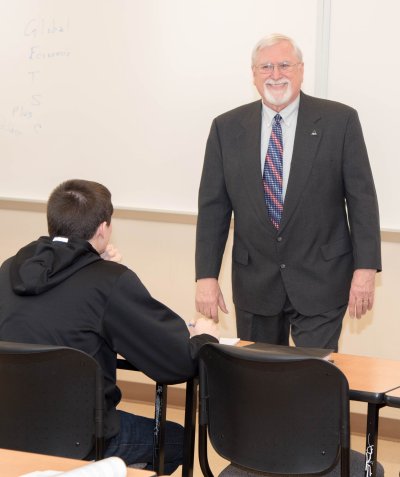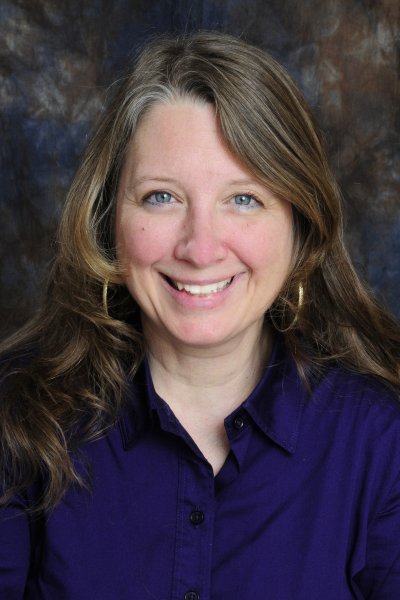CSM Professor Rex Bishop

For NISOD Excellence Award recipient and College of Southern Maryland Professor Rex Bishop, his path as an educator can be traced to his Boy Scout days when as a 16-year-old he taught younger scouts to tie knots and earn badges during summer camp. The path eventually led to a 28-year career as a professor at CSM where he brought his practical style to his role as academic chair of the business department.
For Bishop, his path as an educator can be traced to his Boy Scout days when as a 16-year-old he taught younger scouts to tie knots and earn badges during summer camp. The path eventually led to a 28-year career as a professor at CSM where he brought his practical style to his role as academic chair of the business department.
Following 19 years as an administrator at CSM, Bishop has returned full time in the classroom. “I wanted to go back to the classroom to finish my career, and I’m glad I did,” said Bishop. “I always taught some my entire career but didn’t teach full time when I was in administration.” Bishop said he liked a “half and half” split between classroom and administration duties, “but I was always close to the classroom.”
Bishop’s background in cooperative education served him well in his teaching, which includes introductory business, economics, and human relations and leadership. “Most of the students in my courses are looking for employment enhancement – jobs. And that fits well with me, because that’s what I like to teach about – practical applications that [students] can use in work and life.”
Bishop’s introductory business classes feature a career analysis, where students take an “interest inventory” to see what jobs fit their personalities. They leave the class armed with a resume and cover letter, and they also work on a company profile designed to show how to research potential employers. “Before you interview with a job, you should know something about the company,” Bishop said, adding that those tasks align well with the outcomes and assessments in the college’s business programs.
Bishop breaks up his classes with PowerPoint presentations, group discussions, videos and other activities, including guest speakers from the college’s career services department and the library. “The key to teaching with all the technology … is that it all fits together, so that [students] understand the theories and the knowledge and see that it fits into something else they are doing.”
Students in Bishop’s classes are challenged to make decisions after reviewing short case studies, which Bishop calls vignettes. “They could be on ethics, management situations … usually I do it [with students in] groups of two or four, so students see how other people think, too.” Students write a couple of paragraphs and do what Bishop calls “write then think.” Students write an answer and then discuss the answer in a group. “They have to write their answer and then they talk. So they have to make an individual decision and then make a group decision.”
Bishop’s international experience also provides material for the classroom. He has been a presenter at overseas conferences and has worked to foster CSM partnerships in other countries. For example, in 2001, Bishop conducted a presentation in Moscow to international instructors on CSM’s self-paced microcomputer training.
He and CSM Professor Dr. Mary Beth Klinger worked on a grant that eventually led to a relationship with the Estonian Business School, including a faculty exchange program. Both continue to be active members of an editorial board of a peer-reviewed scholarly journal through the business school, based in Tallinn.
Klinger, who has worked with Bishop since 1998, describes him as outgoing, open to new initiatives and supportive throughout her career. “He has a lot of knowledge,” Klinger said, adding, “He’s always willing to try something new.”
Bishop enjoys offering students glimpses of different foreign business practices. He recalled visiting a restaurant in Switzerland in the early evening and was told that he was welcome to stay and have a cup of coffee, but since the staff ate dinner together between 5:30 and 6 p.m., there would not be any meals served to customers during that time. So Bishop sat down with his coffee and waited until dinner was over for the staff to return. “I saw [the workers] all back there together, interacting and talking to each other. At 6 o’clock, they all started working again. I thought, what a great team-building exercise they had there.”
In a global economics class, presenting such situations can be interesting for students, Bishop said. “At first, [they] think it’s wrong. Then [they] realize it might even be better, that different cultures are just different. And in today’s diverse employment world, students have to work in a more diverse environment than I did. They need to be able to understand that.“
Bishop has been active at CSM, from faculty development to community outreach. He has been an advisor for student clubs, coordinated international events in the three Southern Maryland counties, served on a host of faculty committees and represented the college at community functions. His efforts in curriculum development at CSM included helping to set up a job recruitment event in collaboration with the Navy and the Patuxent River Naval Air Station. The initiative was part of a CSM marketing class.
Bishop’s latest efforts at the college are as a member of the college’s environmental sustainability committee, with an eye on everything from energy-efficient buildings to recycling efforts. “I do emphasize conservation – emphasize about caring about people, not only your customers but also your employees and the community. It’s not just the profit for the organization and that’s it,” he said. “I think it’s the right balance, the right way to run a business. The return customers are the way you sustain a good profit in the long run.”
In the classroom, Bishop also focuses on ethical behavior in the business world. “It’s the old story: Good ethics is good business. I put that on the board with a question mark and we talk about that when we do the ethics chapter,” Bishop said. “I give students all the reasons why it is – cut down on turnover, better to attract investors, feel better about yourself and the business if you’re ethical. I believe that businesses would be better off if they did it that way.”
Outside the college, Bishop, an Ohio native and former high school coach, remains an avid sports fan. He has supported efforts to elect the late William “Dummy” Hoy, a deaf baseball player for the Cincinnati Reds and Washington Senators, into Major League Baseball’s Hall of Fame. According to Bishop, the National Baseball Hall of Fame says it is controversial but many believe that it was Hoy who invented the hand signals for ball and strikes.
All in all, it’s been a satisfying career for Bishop, who earned his bachelor’s and master’s degrees from Bowling Green State University in Ohio, and worked at Germanna Community College in Virginia from 1972-1985 before moving to CSM. Bishop says that community college students are more realistic and practical. “That’s why I like community college. Because that’s me, I think. I’m a realist. Practical. A lot of our students have work experience. Even if they’re 18 years old, they’ve been out working,” Bishop said.
CSM Early Childhood Education Instructor Yvette Dodson

NISOD Excellence Award recipient and College of Southern Maryland Early Childhood Education Instructor Yvette Dodson has found that what works with kids works with all ages, and teaching her college students the importance of physical movement in learning can help them handle a host of situations, from childcare to preschool to early elementary education.
When CSM’s Dodson poses a multiple-choice question to the class, instead of students marking A, B, C or D, they answer by walking to one of the four walls in the classroom to indicate which answer they select.
It’s a technique that many teachers use with students from preschool to elementary so as to incorporate movement into the classroom, and Dodson uses the same strategies in her college classes with adults, who range from teenagers to 60-somethings. “It’s all to get your body involved. You have to be committed to your answer when you move,” she said.
Dodson has found that what works with kids works with all ages, and teaching her college students the importance of physical movement in learning can help them handle a host of situations, from childcare to preschool to early elementary education.
Dodson believes that early childhood educators, from parents to care providers to teachers, play an important role in society. “What I think is really important is creating a community of learners,” she said. “We all come to the classroom with experiences or knowledge that is valuable to be shared. My job is to facilitate that – to assess what it is they come in knowing and … being able to connect it to course content so it’s useful.”
For more on Dodson, visit http://bit.ly/1wkOxOW.
NISOD Excellence Award
NISOD’s Excellence Award recipients will be celebrated during its annual International Conference on Teaching and Leadership Excellence, May 23-26, in Austin, Texas. During the Excellence Awards Dinner and Celebration, held in conjunction with NISOD’s annual conference, each recipient receives a specially cast, pewter medallion hung. For information about NISOD, visit www.nisod.org.
CSM Faculty Excellence Award
CSM’s Annual Faculty Excellence Award recognizes outstanding contributions to teaching; curriculum and professional development; college community and the community at large. The award, which has been given since 1989, is announced during spring commencement. The Annual Faculty Excellence Award Honoring Adjunct Faculty recognizes outstanding contributions to teaching, professional development, the CSM mission and the community at large. First awarded in 2007, this annual award is presented during winter commencement. For a full listing of recipients of the annual faculty excellence awards at CSM, visit www.csmd.edu/Faculty/excellence/ .

